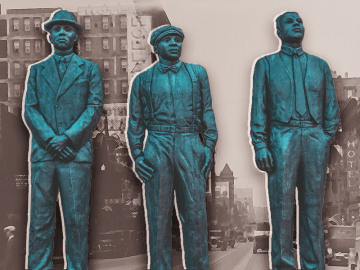Francine Ouenuma in Smithsonian:
 Over the years, the horror of June 15, 1920, when three black men were lynched by a white mob in Duluth, faded away behind a “collective amnesia,” says author Michael Fedo. Faded away, at least, in the memories of Duluth’s white community. In the 1970s, when Fedo began researching what would become The Lynchings in Duluth, the first detailed accounting of the night’s events, he met resistance from witnesses who were still alive. “All of them said, gee, why are you dredging this up again? All of them except the African American community in Duluth. It was part of their oral history, and all of those families knew of this event,” Fedo recalls. On that late spring night, 100 years ago, a crowd estimated at 5,000 people smashed their way into the Duluth police station and seized six African American men who had been arrested in connection with the alleged crime of raping a white teenager. After a mock trial in which three of them—Elias Clayton, Elmer Jackson and Isaac McGhie—were “convicted,” a crowd of men, women and children cheered as they were beaten and lynched, one by one. Photos of the macabre aftermath were later sold as postcards, while the national press reported on the incident with dismay.
Over the years, the horror of June 15, 1920, when three black men were lynched by a white mob in Duluth, faded away behind a “collective amnesia,” says author Michael Fedo. Faded away, at least, in the memories of Duluth’s white community. In the 1970s, when Fedo began researching what would become The Lynchings in Duluth, the first detailed accounting of the night’s events, he met resistance from witnesses who were still alive. “All of them said, gee, why are you dredging this up again? All of them except the African American community in Duluth. It was part of their oral history, and all of those families knew of this event,” Fedo recalls. On that late spring night, 100 years ago, a crowd estimated at 5,000 people smashed their way into the Duluth police station and seized six African American men who had been arrested in connection with the alleged crime of raping a white teenager. After a mock trial in which three of them—Elias Clayton, Elmer Jackson and Isaac McGhie—were “convicted,” a crowd of men, women and children cheered as they were beaten and lynched, one by one. Photos of the macabre aftermath were later sold as postcards, while the national press reported on the incident with dismay.
…In the final moments before the lynching, some tried to reason with the crowd. According to Fedo, two judges arrived to plead the case for the law to take its course, but to no avail. A local Catholic priest, William Powers, climbed the post himself. “In the name of God and the church I represent, I ask you to stop,” he entreated the crowd, according to a report in the National Advocate. His exhortation fell on deaf ears amid the din of rallying cries, which by then included false reports of Tusken’s death. Duluth’s white population readily accepted the rape allegation, and were eager to condemn the African American prisoners. “It wasn’t as if [Powers] was dealing with a small group of people who were a minority in a society,” says William D. Green, professor of history at Augsburg Universityand a member of the Minnesota Historical Society’s Emeritus Council. “The mob of Duluth was made up of all classes, mothers taking their kids.”
The three victims had themselves barely reached adulthood. According to Fedo, pleas of innocence from McGhie—the first to be lynched—did nothing to dissuade the mob. Witnesses later recalled the second man, Jackson, coolly throwing a pair of dice from his pocket on the ground with the words “I won’t need these any more in this world.”
More here.
